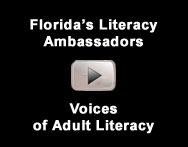|
Is there a need
for volunteer tutors?
Yes. In many communities there are more
students than there are teachers, so students are put on waiting
lists. There is a need for tutors to work with adult learners
to help them improve their reading, writing, math, and/or English
language skills. Some instructors also help students prepare for
the General Educational Development (GED) examination. Most of
the literacy programs in Florida use tutors in a one-to-one setting,
or in small groups [one tutor working with 2-6 students]. Many
programs also have opportunities for tutors to assist teachers
in a classroom, either roaming to help all the students, or working
with one or more struggling students.
How do I learn
to tutor?
Volunteers attend tutor-training workshops.
These workshops, which are typically 12 to 16 hours long, introduce
you to the techniques used in tutoring an adult and will cover
a range of topics from the various core materials used in tutoring
to designing a lesson plan.
What are the
qualifications to be a tutor?
Tutors should be high school graduates
or have a GED. Previous teaching experience is generally not required.
Do I need to
speak another language to teach English for Speakers of Other
Languages (ESOL)?
No. The training workshops prepare you
to work with a student with whom you do not share a common language.
How much time
does it take to tutor?
Most programs request volunteers give 2-3
hours per week for 6+ months. However, many programs welcome seasonal
volunteers for a shorter period of time.
How is tutoring
organized and set-up?
Volunteers work with a tutor coordinator
who will ask you what subject you would like to tutor, the type
of student you would like to work with, and the times that you
are available. With this information he or she will arrange for
you to meet with an adult learner who has already been tested.
Where does tutoring
take place?
The location for the tutoring can be just
about anywhere including a community college, local library, business,
or community center. Programs generally do not support in-home
tutoring.
How old are the
students?
Students are adults of all ages. Family
literacy programs are also sometimes in need of tutors to work
with children as well.
What if I need
to travel or miss some tutoring sessions?
Programs understand that you will have
scheduling conflicts. They just ask that you notify your student
in advance.
Do literacy
programs have other volunteer opportunities in addition to tutoring?
Yes. Most literacy organizations have a
number of volunteer needs which may include proving administrative
support, fundraising, interviewing students and serving on a board
of directors.
How can I become
a volunteer tutor?
Call the state literacy hotline at 1-800-237-5113
or e-mail us at literacyinfo@floridaliteracy.org
and we will provide you with information on volunteer literacy
programs in your area.
Back
to Top |












